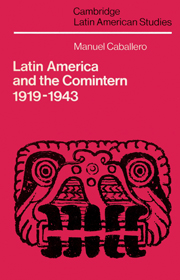Summary
Well! I've often seen a cat without a grin, thought Alice, but a grin without a cat! It's the most curious thing I ever saw in all my life!
CARROLLIn the plan for fostering world revolution proposed by the Third International from its foundation in 1919, Latin America occupied the last place. Thus, the Comintern was founded to play the role of high command of a socialist revolution which would spread from Russia to Germany and to the rest of Europe, later the world, in a very short time. Such a revolution would never arrive in Latin America other than as a result of its victory either in Europe or the United States. In truth, the Comintern never witnessed a Leninist revolution in the western hemisphere. But it also never witnessed the triumph of such a revolution elsewhere. Its whole scheme of world revolution revealed itself as a misconception.
Despite their projections, the revolution did not come. It failed in Germany, it failed in Europe. The Comintern never succeeded in provoking a significant revolutionary movement in the United States, nor even in developing there an important Communist Party. The Comintern conceived the revolutionary movement of Latin America as a support for the forthcoming Socialist revolution in the United States. Ironically, its section in that country never even became strong enough to be able to offer real support to the revolutionary movements that eventually broke out in Latin America.
- Type
- Chapter
- Information
- Latin America and the Comintern, 1919–1943 , pp. 149 - 155Publisher: Cambridge University PressPrint publication year: 1987



